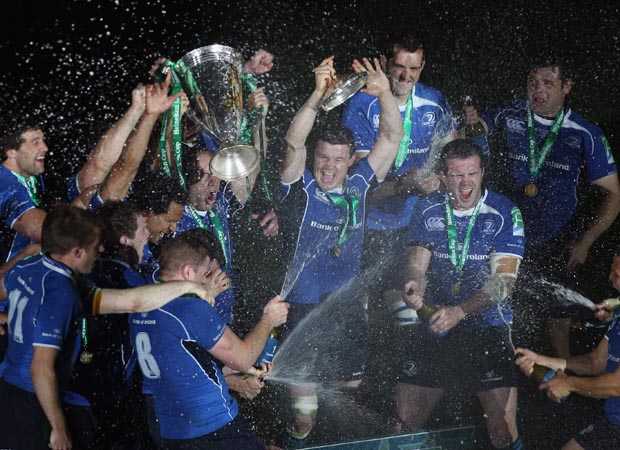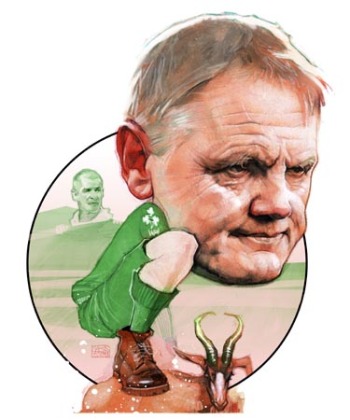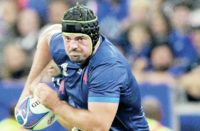 Look at the most successful sides in Europe, whether club or country, and you will usually find that there is a Kiwi coach involved. Joe Schmidt is the latest to make an impact in double quick time, bringing a rigour and fluidity to Ireland's game which had been lacking, and smoothing over Brian O'Driscoll's departure more seamlessly than anyone could have expected.
Look at the most successful sides in Europe, whether club or country, and you will usually find that there is a Kiwi coach involved. Joe Schmidt is the latest to make an impact in double quick time, bringing a rigour and fluidity to Ireland's game which had been lacking, and smoothing over Brian O'Driscoll's departure more seamlessly than anyone could have expected.
In the process, Ireland have leap-frogged England and Australia in the world rankings this autumn, claiming third place even before they beat the Wallabies yesterday.
Schmidt, like Warren Gatland before him, stands up to scrutiny under the old Fred Allen adage that, ‘if you want to know how good a coach is, look at his record' (the All Blacks won all 14 of their Tests when Allen was NZ coach from 1966 to 1968).
Schmidt was assistant coach when Bay of Plenty won the Ranfurly Shield in 2004, and then was assistant coach to another Kiwi, Vern Cotter, when Clermont won the French Championship (Top 14) for the first time in 2010.
After moving to Ireland as head coach of Leinster, Schmidt guided them to back-to-back Heineken Cup titles in 2011 and 2012.
If England had acted swiftly they might tempted Schmidt into the fold in 2012, but they settled on Stuart Lancaster instead.
Now, one year into his tenure as Ireland coach, Schmidt has won a Six Nations title, beaten South Africa and Australia this autumn, and, last autumn taken them to within a minute of beating New Zealand.
Schmidt has won nine of his 12 Tests in charge of Ireland, losing his first two matches to Australia and NZ, with the only blemish in 2014 coming in the knife-edge away defeat to England in the Six Nations.
That he has done large chunks of this without the services of talismanic forwards like Sean O'Brien and Cian Healy, only enhances his standing.
 The benefits Schmidt has brought to Irish rugby already shows that there are some shrewd minds in the IRFU hierarchy, and those of Leinster, Munster, Ulster and Connacht – minds that are open to the concept that you employ the best to learn from them.
The benefits Schmidt has brought to Irish rugby already shows that there are some shrewd minds in the IRFU hierarchy, and those of Leinster, Munster, Ulster and Connacht – minds that are open to the concept that you employ the best to learn from them.
It was a similar attitude that saw Wales swoop for Gatland and Shaun Edwards after their 2007 World Cup debacle against Fiji, with WRU chief executive Roger Lewis signing the double Heineken Cup-winning Wasps duo while the RFU dithered over their next head coach move.
Wales have subsequently won two Six Nations Grand Slams and a title, and were 2011 World Cup semi-finalists (and, hamstrung by Sam Warburton's sending off against France, unlucky not to go further).
Gatland and Edwards have achieved this despite the Welsh regions being at a low ebb amid constant feuding with their national Union.
Cotter, meanwhile, has made a promising start as coach of Scotland despite the limited resources at his disposal, and there are signs that their days as Six Nations doormats will soon be at an end. Amen to that, because the tournament desperately needs a stronger Scotland.
England, meanwhile, have had a policy since Clive Woodward delivered the World Cup over a decade ago of almost slavishly promoting coaches from within the RFU structure, or the Premiership and Championship.
This might explain why there is so little tactical variety or innovation in the Premiership, with many clubs adhering to identikit strategies.
In that period England have claimed a single Six Nations title, in 2011 under Martin Johnson, but otherwise have under-delivered at senior level despite the academies producing a series of U20 teams, and coaches, which have reached five Junior World Championship finals – and won the last two.
With the exception of those U20 coaches, Rob Hunter and Nick Walshe, no English or Premiership coaches have won anything else of note on the international stage since Wasps, under Gatland and Edwards, beat Leicester in the 2007 Heineken Cup final.
That eight-year drought is proof that with a few exceptions – notably Exeter, Saracens and Northampton – English elite coaching is failing the Fred Allen track-record test miserably.
It should open up to new coaching ideas, and if a Kiwi coach like Schmidt is going to deliver more for England than the home-grown version then the RFU should snap him up.
There were shades of the 2003 World Cup final scrum fiasco at Welford Road last weekend when Saracens were penalised – with referee Tim Wigglesworth in Andre Watson mode – for dominating the last scrum of the Premiership clash. This allowed Owen Williams to kick a penalty which gave Leicester a fortunate 21-21 draw.
It was clear to even the most one-eyed Tigers fan that their tight-head, Fraser Balmain, was unable to hold Rhys Gill's drive – which was square and straight – and moved his hips outwards before going sideways and up. Yet, Wigglesworth ruled against Gill.
Wigglesworth had earlier awarded a penalty to the home side at a lineout when they were trailing 21-15. Alistair Hargreaves was non-plussed, when, having competed legitimately for a Leicester throw, he then held his arms wide to show he was not impeding their jumper.
Williams kicked the penalty awarded against the Saracens' captain to keep the home side in striking distance.
What these penalties underlined is that some referees are too prone to giving home-town decisions, and the incidents also highlighted the conflict of interest facing Ben Kay as a BT rugby commentator as well as a member of the Leicester board, when he is commentating on his own club.
Kay's view of the scrum penalty was that Gill had a reputation for packing inwards that might have preceded him.
This was completely opposite to the views from the BT studio offered by Lawrence Dallaglio and London Irish forwards coach Glenn Delaney, who stated clearly that Balmain was at fault.
This underlines why Kay – irrespective of whether the criticism is fair – could be accused of not being objective, and should not commentate on a club for whom he is a non-executive director.
*This article was first published in The Rugby Paper on November 23.


























